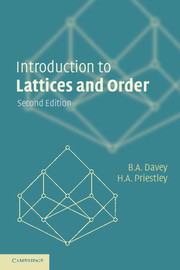Book contents
- Frontmatter
- Contents
- Preface to the second edition
- Preface to the first edition
- 1 Ordered sets
- 2 Lattices and complete lattices
- 3 Formal concept analysis
- 4 Modular, distributive and Boolean lattices
- 5 Representation: the finite case
- 6 Congruences
- 7 Complete lattices and Galois connections
- 8 CPOs and fixpoint theorems
- 9 Domains and information systems
- 10 Maximality principles
- 11 Representation: the general case
- Appendix A: a topological toolkit
- Appendix B: further reading
- Notation index
- Index
1 - Ordered sets
Published online by Cambridge University Press: 05 June 2012
- Frontmatter
- Contents
- Preface to the second edition
- Preface to the first edition
- 1 Ordered sets
- 2 Lattices and complete lattices
- 3 Formal concept analysis
- 4 Modular, distributive and Boolean lattices
- 5 Representation: the finite case
- 6 Congruences
- 7 Complete lattices and Galois connections
- 8 CPOs and fixpoint theorems
- 9 Domains and information systems
- 10 Maximality principles
- 11 Representation: the general case
- Appendix A: a topological toolkit
- Appendix B: further reading
- Notation index
- Index
Summary
Order, order, order – it permeates mathematics, and everyday life, to such an extent that we take it for granted. It appears in many guises: first, second, third, …; bigger versus smaller; better versus worse. Notions of progression, precedence and preference may all be brought under its umbrella. Our first task is to crystallize these imprecise ideas and to formalize the relationship of ‘less-than-or-equal-to’. Besides presenting examples and basic properties of ordered sets, this chapter also introduces the diagrams which make order theory such a pictorial subject and give it much of its character.
Ordered sets
What exactly do we mean by order? More mathematically, what do we mean by an ordered set?
Order. Each of the following miscellany of statements has something to do with order.
(a) 0 < 1 and 1 < 1023.
(b) Two first cousins have a common grandfather.
(c) 22/7 is a worse approximation to π than 3.141592654.
(d) The planets in order of increasing distance from the sun are Mercury, Venus, Earth, Mars, Jupiter, Saturn, Uranus, Neptune, Pluto.
(e) Neither of the sets {1, 2, 4} and {2,3,5} is a subset of the other, but {1,2,3,4,5} contains both.
(f) Given any two distinct real numbers a and b, either a is greater than b or b is greater than a.
Information
- Type
- Chapter
- Information
- Introduction to Lattices and Order , pp. 1 - 32Publisher: Cambridge University PressPrint publication year: 2002
Accessibility standard: Unknown
Why this information is here
This section outlines the accessibility features of this content - including support for screen readers, full keyboard navigation and high-contrast display options. This may not be relevant for you.Accessibility Information
- 2
- Cited by
